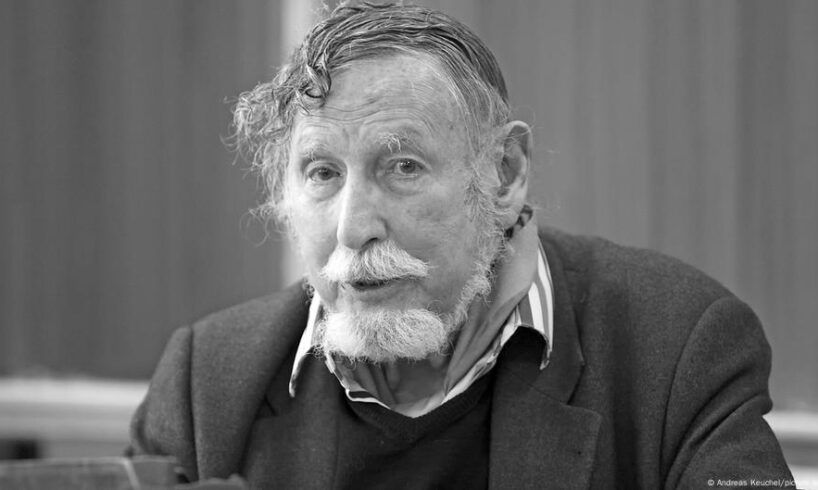
Georg Stefan Troller, who died on September 27 at the age of 103, lived what could simply be described as a storied life.
An Austrian Jew who escaped the Nazis, he emigrated to the US but returned to Germany to work for the Allied Forces as an interpreter during the liberation of the Dachau concentration camp. Troller would eventually spend the rest of his life in Europe, gaining prominence as a writer and reporter, and especially for his unconventional interviews of international luminaries for German television.
Fleeing the Nazis
Born on December 10, 1921 to a Jewish furrier family in Vienna, he was taunted for his Jewish heritage on the streets and by schoolmates. “You had to live with it, and it got worse under the Nazis,” he once recalled.
Troller’s father however ensured he got a good education and made him read all the classics; he knew the words to the Faust monologue by heart. He trained to become a bookbinder but was eventually forced to flee the Nazisat age 16, travelling via Czechoslovakia to France. In his suitcase he’d carried Karl Kraus’ The Last Days of Mankind.
In 1941, he secured an American visa in Marseilles, and was drafted into the US military service in 1943. As the Allied troops advanced through occupied France and Nazi Germany, he served as an interpreter in interrogating German prisoners of war.
“Back then, I never heard the word ‘liberation,'” Troller often said in interviews, adding that freedom and democracy weren’t even part of the German way of thinking. “They all admired our jeeps, the walkie-talkies. No wonder you won the war, with that equipment, they would say,” he said in a 2005 TV interview with German public broadcaster WDR.
Troller worked for the Allied Forces as an interpreter during the liberation of the Dachau concentration campImage: Sven Hoppe/dpa/picture alliance
A visit to Hitler’s Munich home
In 1945 in Munich, the young GI was present when the US army searched Adolf Hitler’s private residence. He pocketed a few “Nazi souvenirs” and sent them to his father in the US, who was shocked.
On May 1, 1945, Troller arrived at the Dachau concentration camp, which was liberated by US troops, to interrogate SS officers who had been captured there. What he encountered there made a lasting impact on him, and he could only stomach the sight of the emaciated prisoners and corpses through his camera lens.
After a short stint at Radio Munich, he worked as a reporter for Munich’s Neue Zeitung. His heart, however, was in Vienna. “At that time, I walked all the streets I knew, for days, for nights, to quell my homesickness,” he said. He concluded however that “you can’t regain a homeland again any more than you can a childhood.”
Returning to the USA, he studied drama and theater, only to travel to Paris in 1950 on a scholarship to study at the Sorbonne.
“Paris opened my eyes and taught me so much,” he wrote in his 2009 memoir. “It was big city life compared to the small-town limitations you found everywhere in Germany,” he said of the city that would become home.
Troller also went to German schools to talk to kids about his lifeImage: Miguel Villagran/dpa/picture alliance
Legendary interviews
In early 1960s Paris, Troller found his calling as a TV reporter. As a correspondent for WDR, his nine-year long Paris Journal show gave viewers delightful insights into lesser-known aspects of the City of Lights.
In 1971, he began working for Germany’s ZDF TV broadcaster, which would set the course for his life. Over the next 22 years, he wrote TV history with his legendary unconventional interview show, Personenbeschreibung (Describing People). His guests included Marlon Brando, Brigitte Bardot, Alain Delon, Woody Allen, Kirk Douglas and Romy Schneider.
Initially, producers frowned upon his subjective interviewing style, as it lacked the requisite neutrality. However, his sensitive and critical approach to interviewing people struck a chord, turning him into a role model amongst other journalists.
Self-healing through journalism
To him, the camera was a protective shield. “Being a journalist was a means of self-healing,” Troller once recalled. “My soul as a Jewish emigrant who had escaped the Holocaust and who had lost 19 relatives was wounded,” he told the DJV Journal in a 2017 interview, adding that he calls the job he does “healing through other people.” A good interview is almost like a confession, he said.
Later, he turned to TV films, documentaries, books, photo books and essays for magazines.
In 2019, he published a memoir close to his heart, entitled Liebe, Lust und Abenteuer — 97 Begegnungen meines Lebens (Love, Desire and Adventure — 97 Encounters in My Life).
Prior to the COVID-19 outbreak, the indomitable personality was still going on book tours to promote his memoir. The then 98-year-old man wowed fans with readings about the story of his life with his trademark self-deprecating, Viennese humor.
This article has been translated from German.





